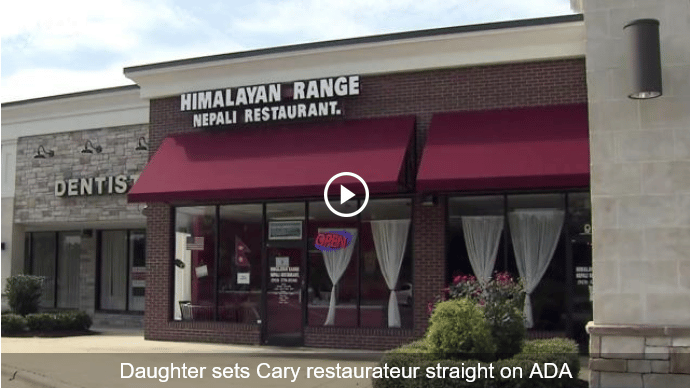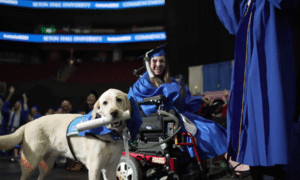“This post contains affiliate links, and I will be compensated if you make a purchase after clicking on my links.”
A blind man’s mistreatment by a North Carolina restaurant proves, once again, that businesses and employees are still largely unaware of service dog access laws.
On Wednesday, Sean Mealin and a friend stopped for lunch at the Himalayan Range Nepali Restaurant in Cary, North Carolina.
When the hostess saw Mealin’s service dog, Simba, they were told to leave.
“She went to the back of the restaurant and a few minutes later came back and said, ‘My manager says no dogs are allowed,’” Mealin explained to WNCN.
After explaining to the hostess several times that under the American’s With Disabilities Act, Simba had a legal right to join him inside the restaurant, he asked to speak with the manager.
“I said, ‘Can you have your manager come out? I’d like to talk to him,’ and she said, ‘No, he’s busy,’ and at the time it didn’t seem like the restaurant was busy. After checking with my friend afterwards we were the only customers in there. So finally, I said, ‘Just to be absolutely clear, you are refusing me service because I have a guide dog with me?’ and she said ‘Yes.’”
Embarrassed that something he relies on for daily life, something so important to him was the reason he couldn’t have lunch with his friend, Mealin posted his story to Facebook to help educate both the restaurant manager and the general public who may hear his story.
“Almost all the workers at the restaurant are immigrants and have no concept of service animals,” Prativa Karki, whose parents own the restaurant, wrote in response to his post. “They did not know the law, they simply saw your dog and thought dogs aren’t usually allowed at the restaurant and said no.”
WNCN spoke with Amear Karki, owner of the Himalayan Range Nepali Restaurant, who apologized for the incident and promised to better train his employees after his daughter explained the law to him. He’s invited Mealin and Simba to return for a meal.
While this story had a positive outcome, it proves that there remains a serious lack of understanding of service dog access laws – and not just among business owners.
In addition to a clear need for business owners to both better understand ADA laws and to better train their employees on the access rights of service dogs and their handlers, the media have a responsibility to accurately report those laws.
We found this well-intended news report about Mealin’s incident at the Himalayan Range Nepali Restaurant. Pay close attention to how the reporter explains the laws:
The newscaster says, “Under the American’s With Disabilities Act, a person with a disability may bring a certified guide dog into any public space.”
Although well-meaning, it’s statements like these, made by trusted news sources, that further confuse the public who may not fully understand the law. Here’s why:
First, that statement implies that only guide dogs, or seeing eye dogs, are granted public access rights when, in fact, guide dogs for the blind or vision impaired are only a small segment of the huge variety of service dogs and the assistance they provide. Yes, guide dogs are permitted – so are PTSD service dogs, diabetic and seizure alert dogs, mobility assistance dogs, hearing dogs, and in some cases, even mini horses, among many, many more.
Second – and this is VERY important – there is no such thing as a “certified guide dog.” While service dogs are defined under federal law, there is no official training these dogs must follow, no central registry that they must be a part of, and no standard certification that they must receive.
A service dog is not legally required to wear a vest, patch, or carry any type of ID card, though many service dog teams do these things because it’s easier to just show a meaningless ID card when asked for one than it is to explain the laws to business owners, managers, and employees, and even law enforcement officers that haven’t been educated.
To understand more about service dogs and access rights, click here.

























